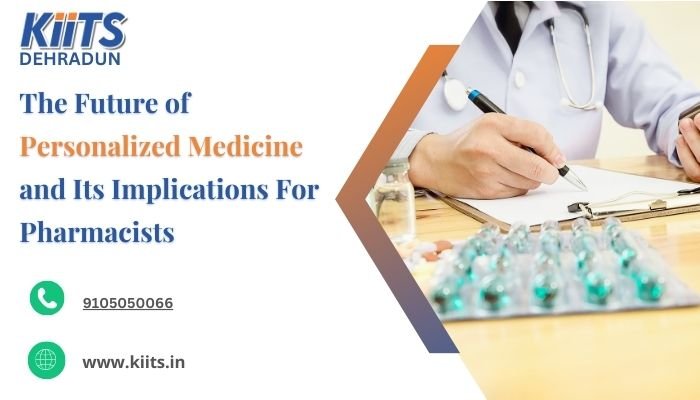Personalized medicine, also known as precision medicine, is transforming the healthcare industry by tailoring medical treatments to the individual characteristics of each patient. This innovative approach utilizes genetic, environmental, and lifestyle factors to enhance therapeutic outcomes and minimize adverse effects. As this medicine advances, pharmacists play an increasingly vital role in this evolving field. This article delves into the future of personalized medicine and its profound implications for pharmacists.
Understanding Personalized Medicine

Personalized medicine is predicated on the understanding that each patient is unique, and so should be their medical treatment. Traditional medicine often relies on standardized approaches that may not be effective for everyone due to genetic and environmental differences. Personalized medicine aims to:
Identify Genetic Makeup: Using genomic sequencing to uncover genetic predispositions and variations that impact drug response.
Tailor Treatments: Crafting individualized treatment plans that incorporate genetic, environmental, and lifestyle factors.
Enhance Predictive Medicine: Predicting disease susceptibility and treatment responses to implement preventative measures and early interventions.
The Pharmacogenomics Revolution
Pharmacogenomics, a critical component of personalized medicine, examines how genes influence an individual’s response to drugs. This discipline allows for the development of customized drug therapies based on genetic profiles. For pharmacists, this revolution means:
Optimized Drug Therapy: Recommending drugs and dosages tailored to the patient’s genetic profile, enhancing efficacy and minimizing adverse effects.
Precision Dosing: Adjusting dosages based on genetic information for optimal therapeutic outcomes.
Improved Patient Safety: Reducing the risk of adverse drug reactions by considering genetic predispositions and metabolic pathways.
Expanding Roles for Pharmacists
The shift towards personalized medicine broadens the traditional role of pharmacists in several significant ways:
Genetic Counseling: Pharmacists are increasingly involved in educating patients about pharmacogenomic testing, interpreting test results, and guiding treatment decisions based on genetic data.
Collaborative Healthcare: Pharmacists work closely with physicians, genetic counselors, and other healthcare professionals to develop and implement personalized treatment plans, ensuring comprehensive patient care.
Patient Education: Providing detailed information on how genetic variations affect drug therapy and the importance of adhering to personalized treatment regimens.
Research and Development: Contributing to the creation of new drugs and therapies tailored to specific genetic profiles, thereby advancing medical science and improving patient outcomes.
Implications for Pharmacist Education and Training

The advent of personalized medicine necessitates significant changes in the education and training of pharmacists. Key areas of focus include:
Pharmacogenomics: Incorporating pharmacogenomics into the pharmacy curriculum to equip future pharmacists with the knowledge and skills needed for personalized medicine.
Advanced Clinical Training: Offering specialized training programs and residencies in personalized medicine and pharmacogenomics to prepare pharmacists for emerging roles.
Continuing Education: Providing ongoing education and certification opportunities to keep practicing pharmacists current with the latest advancements in personalized medicine.
Practical Applications and Clinical Integration
Genetic Testing and Analysis: Pharmacists will increasingly be involved in recommending and interpreting genetic tests, helping to guide treatment choices and adjustments based on genetic information.
Customizing Treatment Plans: Using genetic data to personalize medication regimens, including selecting the most effective drugs and determining the optimal dosages for individual patients.
Monitoring and Follow-Up: Pharmacists will play a crucial role in monitoring patients’ responses to personalized treatments, making adjustments as needed, and providing ongoing support and education to ensure adherence and effectiveness.
Challenges and Opportunities
While personalized medicine offers significant benefits, it also presents challenges that pharmacists must address:
Ethical and Privacy Concerns: Managing patient data privacy and addressing ethical issues related to genetic testing and personalized treatments. Pharmacists must ensure that patient information is secure and used responsibly.
Cost and Accessibility: Ensuring that personalised treatments are affordable and accessible to a broad patient population, which may require advocating for policy changes and working with insurance companies to cover genetic testing and personalized therapies.
Integration into Practice: Overcoming logistical and practical barriers to integrating personalised medicine into everyday pharmacy practice, including updating electronic health records (EHRs) to include genetic information and developing new workflows.
Despite these challenges, the opportunities for pharmacists in the era of personalised medicine are vast. By embracing this paradigm shift, pharmacists can enhance patient care, reduce healthcare costs, and contribute to the advancement of medical science.
Future Outlook
As personalized medicine continues to evolve, pharmacists will play a critical role in its implementation and success. Key trends and developments to watch include:
Integration of Artificial Intelligence (AI): AI and machine learning will enhance the ability to analyze genetic data and predict patient responses to treatments, further personalizing care.
Advancements in Genomic Research: Ongoing research will uncover new genetic markers and pathways, leading to more targeted and effective therapies.
Regulatory and Policy Changes: Evolving regulations and policies will shape the landscape of personalized medicine, affecting how genetic testing and personalized treatments are developed, approved, and reimbursed.
Conclusion
The future of personalised medicine holds immense promise for improving patient outcomes and transforming healthcare. For pharmacists, this future brings expanded roles, new responsibilities, and exciting opportunities to impact patient care positively. By staying at the forefront of pharmacogenomics and personalized treatment, pharmacists will play a pivotal role in the next generation of healthcare, ensuring that each patient receives the most effective and personalized care possible. Embracing the challenges and opportunities of personalized medicine will not only enhance the profession of pharmacy but also significantly improve the lives of patients.








